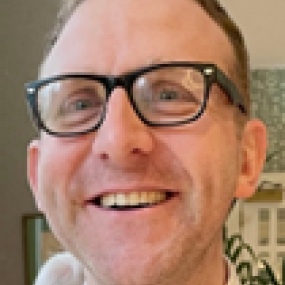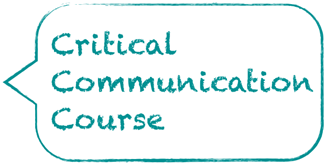Critical Communications: A New Training Opportunity for Intensive Care Trainees in the Severn Deanery

Dr Tom Cloke is a ST7 dual trainee in the Severn Deanery. He has three children Leo (6), Max (4) and Alex (1). Tom studied for a MD PhD in HIV immunology looking at the role of arginase producing neutrophils on T cell function. When not at work or wrestling three children Tom enjoys stereotypical anaesthetic pastimes of coffee, cycling and sarcasm!

Dr Hannah Crofton is a single specialty Critical Care trainee in the Severn Deanery. Hannah also has three children but does not have a pHD! She does have a GNVQ level 1 in motor vehicle mechanics. When not at work she enjoys coffee, swimming and Tom’s sarcasm.

As a newly qualified Foundation Year 1 doctor, I witnessed the devastating impact of poor communication in a clinical setting. A consultant surgeon had the unenviable task of informing a patient that her cancer was inoperable. The conversation was rushed, clinical, and devoid of empathy. The woman sat in stunned silence, her confusion and distress palpable, while the surgeon moved on to his next case without offering any support. That moment stayed with me and underscored the importance of effective, compassionate communication in medicine.
Communication skills teaching is a fundamental part of undergraduate medical training in the UK. However, it is starkly missing from postgraduate training and does not feature explicitly in the Intensive Care Medicine (ICM) curriculum. This gap leaves many trainees underprepared for the complex and emotionally charged conversations they encounter in their roles.
In the demanding world of intensive care, clear and compassionate communication is as essential as clinical expertise. To address this, we have introduced an annual one-day communication simulation-based skills course, Critical Communications. This programme is designed to help intensive care trainees handle complex conversations with confidence and empathy.
What is Critical Communications?
Critical Communications provides an opportunity to rehearse challenging conversations in a safe and supportive environment. Whether it’s breaking bad news, discussing treatment limitations, or addressing family concerns, this course helps trainees enhance their communication skills through realistic, hands-on scenarios.
Using simulation-based learning, trainees engage in practical exercises and receive constructive feedback to refine their approach. The course aims to transform difficult interactions into more manageable and meaningful discussions.
Why Communication Matters in Intensive Care
In intensive care, decisions often carry significant consequences. Clear communication is crucial, not only to convey information but also to provide patients and their families with empathy and support during difficult times. Developing these skills can improve patient care and foster trust within the healthcare team.

How the Course is Structured
Developed by two intensive care trainees (Hannah Crofton and Tom Cloke) and a post-CCT fellow with a special interest in communication and palliative care (Sophia Henderson), Critical Communications combines theoretical learning with practical application. The day begins with interactive workshops on effective communication principles, laying the groundwork for the rest of the course.
The core of the course includes five small-group simulation exercises where participants take turns acting as the communicator while others observe. Trainees participate in realistic scenarios—such as declining to admit a patient to ICU or explaining devastating brain injury—with professional actors and facilitators. Each simulation is followed by a debriefing session, allowing participants to reflect on their performance and receive feedback from faculty and peers. Our faculty is purposefully diverse and we are lucky to have a mixture of doctors, specialist nurses, psychologists and educationalists providing feedback. Each brings a unique perspective to the day.
These scenarios offer a valuable opportunity to test strategies and learn from diverse perspectives in a supportive environment.

During the lunch break, participants have the chance to engage with Dr Kathryn Mannix (retired palliative care consultant and author of Listen) in a lively Q&A session. Dr Mannix is uniquely qualified for this role, having spent decades working in palliative care, where sensitive and effective communication is central to supporting patients and their families through some of life’s most challenging moments.
The final session of the day is a workshop on communication with children of patients in intensive care, delivered by the charity Winston’s Wish. Their mission is to support children and young people after the death of a parent or sibling, helping them navigate grief and loss with understanding and resilience.
Trainees Share Their Experience
Feedback from candidates on the January 2024 course highlights its impact:
“I went from feeling under confident to confident and managed a lot of emotional development in a single day.”
“The professional actors made the scenarios feel incredibly real. This was the first time since medical school I’ve been able to practice my communication skills in this way. It was amazing to build on existing skills in a safe environment.”
“Communication skills practice with a mixed range of faculty backgrounds gave an excellent range of ideas.”
“Scenarios were relevant and actors were fantastic. It was helpful to have a mix of faculty, not just ICU consultants, to bring different perspectives.”
“The opportunity to practice difficult communication with feedback in a safe way. Also, the excellent food and drinks!”
“Really good day - should be run annually.”
“It was outstanding.”
What’s Next?
We have funding to run the course annually for ICM trainees in the Severn Deanery. We hope the course will continue to evolve, incorporating participant feedback and increasing the catalogue of common scenarios encountered by intensive care trainees and consultants.
Additionally, there are plans to expand the course to other members of the extended team including our ACCP colleagues and members of our outreach team. This will enable more people to benefit from this unique learning opportunity. By sharing resources and expertise, we aim to create a consistent and high-quality communication training framework nationwide, tailored to the needs of intensive care professionals.
If you are interested in running a similar course in other parts of the UK, please contact us. We are eager to collaborate and share our expertise to help improve communication training across the nation.
Thanks and Acknowledgements
We would like to extend our heartfelt thanks to the following individuals and organisations who made this course possible:
- North Bristol NHS Trust for generously providing the use of rooms in the Learning and Resource Centre.
- Kit and Nat from the Simulation Team at North Bristol NHS Trust for their invaluable support.
- Judi and her team of professional actors from The Magic Garden, whose expertise brought realism and depth to the scenarios.
- Our dedicated faculty, including ICU and palliative care consultants, palliative care specialist nurses, and clinical psychologists, who shared their time and expertise to enrich the learning experience.
Tom Cloke (t.cloke@nhs.net)
Hannah Crofton (hannah.crofton@nbt.nhs.uk)
